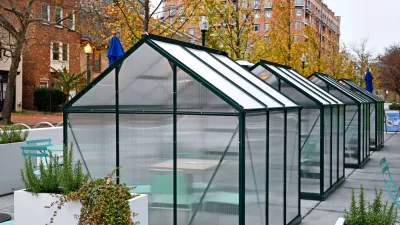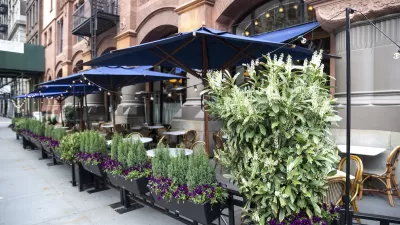A California bill approved in 2018 legalized restaurants to locate in homes, setting the foundation for a new restaurant economy just when communities needed it most.

Farley Elliott reports on the effects of AB 626, approved in 2018 to amend the California Retail Food Code to allow microenterprise home kitchens.
The text of AB 626, authored by Assemblymember Eduardo Garcia (D-Coachella) reads as follows.
This bill would, among other things, include a microenterprise home kitchen operation within the definition of a food facility, and would define a microenterprise home kitchen operation to mean a food facility that is operated by a resident in a private home where food is stored, handled, and prepared for, and may be served to, consumers, and that meets specified requirements, including, among others, that the operation has no more than one full-time equivalent food employee and has no more than $50,000 in verifiable gross annual sales.
Here's how Farley explains the bill:
The newly implemented regulation allows anyone to run a licensed restaurant out of their home kitchen and dining room. No commercial space, no food truck, no ghost kitchen, and no staff is needed — just pull some local permits to get certified by the Riverside County public health office.
According to Farley, AB 626 is having an effect in the Inland Empire, where businesses and residents are hustling to make ends meet, and potentially spurring a dining revolution precisely when it's needed most.
Between stay-at-home mandates, high unemployment, and the still-raging coronavirus pandemic, the entrepreneurial opportunities presented by AB-626 could mean tens of thousands of dollars in the hands of local chefs who feed their communities the food they most want to eat.
Farley explores the city of Riverside County for examples like Barra de Pan in Corona, run by Lucy SIlva and family. The article also includes details about the work of developers in delivering the tech platforms to enable the dining revolution.
FULL STORY: Riverside’s Newly Legal Home Restaurants Look to Revolutionize California’s Food Scene

Alabama: Trump Terminates Settlements for Black Communities Harmed By Raw Sewage
Trump deemed the landmark civil rights agreement “illegal DEI and environmental justice policy.”

Planetizen Federal Action Tracker
A weekly monitor of how Trump’s orders and actions are impacting planners and planning in America.

The 120 Year Old Tiny Home Villages That Sheltered San Francisco’s Earthquake Refugees
More than a century ago, San Francisco mobilized to house thousands of residents displaced by the 1906 earthquake. Could their strategy offer a model for the present?

Ken Jennings Launches Transit Web Series
The Jeopardy champ wants you to ride public transit.

BLM To Rescind Public Lands Rule
The change will downgrade conservation, once again putting federal land at risk for mining and other extractive uses.

Indy Neighborhood Group Builds Temporary Multi-Use Path
Community members, aided in part by funding from the city, repurposed a vehicle lane to create a protected bike and pedestrian path for the summer season.
Urban Design for Planners 1: Software Tools
This six-course series explores essential urban design concepts using open source software and equips planners with the tools they need to participate fully in the urban design process.
Planning for Universal Design
Learn the tools for implementing Universal Design in planning regulations.
Clanton & Associates, Inc.
Jessamine County Fiscal Court
Institute for Housing and Urban Development Studies (IHS)
City of Grandview
Harvard GSD Executive Education
Toledo-Lucas County Plan Commissions
Salt Lake City
NYU Wagner Graduate School of Public Service





























